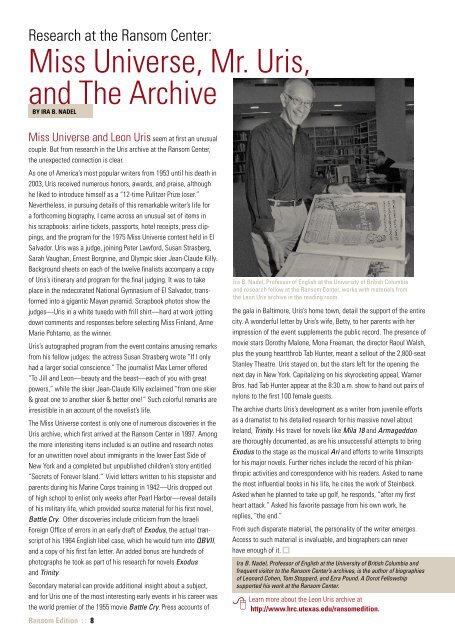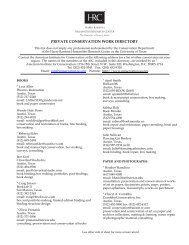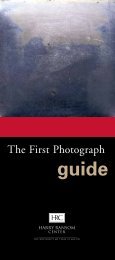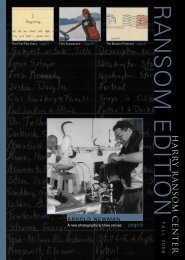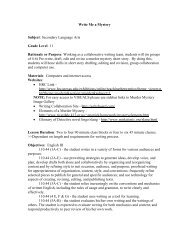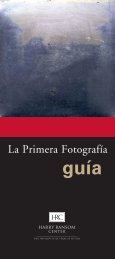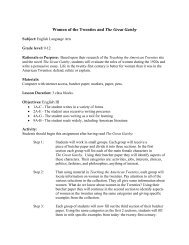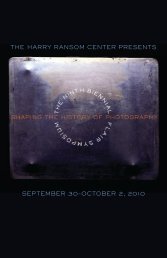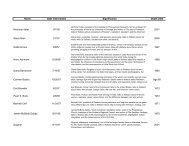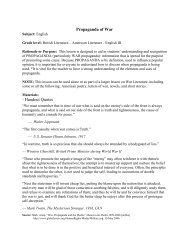Download PDF Version - Harry Ransom Center - The University of ...
Download PDF Version - Harry Ransom Center - The University of ...
Download PDF Version - Harry Ransom Center - The University of ...
You also want an ePaper? Increase the reach of your titles
YUMPU automatically turns print PDFs into web optimized ePapers that Google loves.
Research at the <strong>Ransom</strong> <strong>Center</strong>:<br />
Miss Universe, Mr. Uris,<br />
and <strong>The</strong> Archive<br />
by Ira B. Nadel<br />
Miss Universe and Leon Uris seem at first an unusual<br />
couple. But from research in the Uris archive at the <strong>Ransom</strong> <strong>Center</strong>,<br />
the unexpected connection is clear.<br />
As one <strong>of</strong> America’s most popular writers from 1953 until his death in<br />
2003, Uris received numerous honors, awards, and praise, although<br />
he liked to introduce himself as a “12-time Pulitzer Prize loser.”<br />
Nevertheless, in pursuing details <strong>of</strong> this remarkable writer’s life for<br />
a forthcoming biography, I came across an unusual set <strong>of</strong> items in<br />
his scrapbooks: airline tickets, passports, hotel receipts, press clippings,<br />
and the program for the 1975 Miss Universe contest held in El<br />
Salvador. Uris was a judge, joining Peter Lawford, Susan Strasberg,<br />
Sarah Vaughan, Ernest Borgnine, and Olympic skier Jean-Claude Killy.<br />
Background sheets on each <strong>of</strong> the twelve finalists accompany a copy<br />
<strong>of</strong> Uris’s itinerary and program for the final judging. It was to take<br />
place in the redecorated National Gymnasium <strong>of</strong> El Salvador, transformed<br />
into a gigantic Mayan pyramid. Scrapbook photos show the<br />
judges—Uris in a white tuxedo with frill shirt—hard at work jotting<br />
down comments and responses before selecting Miss Finland, Anne<br />
Marie Pohtamo, as the winner.<br />
Uris’s autographed program from the event contains amusing remarks<br />
from his fellow judges: the actress Susan Strasberg wrote “If I only<br />
had a larger social conscience.” <strong>The</strong> journalist Max Lerner <strong>of</strong>fered<br />
“To Jill and Leon—beauty and the beast—each <strong>of</strong> you with great<br />
powers,” while the skier Jean-Claude Killy exclaimed “from one skier<br />
& great one to another skier & better one!” Such colorful remarks are<br />
irresistible in an account <strong>of</strong> the novelist’s life.<br />
<strong>The</strong> Miss Universe contest is only one <strong>of</strong> numerous discoveries in the<br />
Uris archive, which first arrived at the <strong>Ransom</strong> <strong>Center</strong> in 1997. Among<br />
the more interesting items included is an outline and research notes<br />
for an unwritten novel about immigrants in the lower East Side <strong>of</strong><br />
New York and a completed but unpublished children’s story entitled<br />
“Secrets <strong>of</strong> Forever Island.“ Vivid letters written to his stepsister and<br />
parents during his Marine Corps training in 1942—Uris dropped out<br />
<strong>of</strong> high school to enlist only weeks after Pearl Harbor—reveal details<br />
<strong>of</strong> his military life, which provided source material for his first novel,<br />
Battle Cry. Other discoveries include criticism from the Israeli<br />
Foreign Office <strong>of</strong> errors in an early draft <strong>of</strong> Exodus, the actual transcript<br />
<strong>of</strong> his 1964 English libel case, which he would turn into QBVII,<br />
and a copy <strong>of</strong> his first fan letter. An added bonus are hundreds <strong>of</strong><br />
photographs he took as part <strong>of</strong> his research for novels Exodus<br />
and Trinity.<br />
Secondary material can provide additional insight about a subject,<br />
and for Uris one <strong>of</strong> the most interesting early events in his career was<br />
the world premier <strong>of</strong> the 1955 movie Battle Cry. Press accounts <strong>of</strong><br />
<strong>Ransom</strong> Edition : : <br />
Ira B. Nadel, Pr<strong>of</strong>essor <strong>of</strong> English at the <strong>University</strong> <strong>of</strong> British Columbia<br />
and research fellow at the <strong>Ransom</strong> <strong>Center</strong>, works with materials from<br />
the Leon Uris archive in the reading room.<br />
the gala in Baltimore, Uris’s home town, detail the support <strong>of</strong> the entire<br />
city. A wonderful letter by Uris’s wife, Betty, to her parents with her<br />
impression <strong>of</strong> the event supplements the public record. <strong>The</strong> presence <strong>of</strong><br />
movie stars Dorothy Malone, Mona Freeman, the director Raoul Walsh,<br />
plus the young heartthrob Tab Hunter, meant a sellout <strong>of</strong> the 2,800-seat<br />
Stanley <strong>The</strong>atre. Uris stayed on, but the stars left for the opening the<br />
next day in New York. Capitalizing on his skyrocketing appeal, Warner<br />
Bros. had Tab Hunter appear at the 8:30 a.m. show to hand out pairs <strong>of</strong><br />
nylons to the first 100 female guests.<br />
<strong>The</strong> archive charts Uris’s development as a writer from juvenile efforts<br />
as a dramatist to his detailed research for his massive novel about<br />
Ireland, Trinity. His travel for novels like Mila 18 and Armageddon<br />
are thoroughly documented, as are his unsuccessful attempts to bring<br />
Exodus to the stage as the musical Ari and efforts to write filmscripts<br />
for his major novels. Further riches include the record <strong>of</strong> his philanthropic<br />
activities and correspondence with his readers. Asked to name<br />
the most influential books in his life, he cites the work <strong>of</strong> Steinbeck.<br />
Asked when he planned to take up golf, he responds, “after my first<br />
heart attack.” Asked his favorite passage from his own work, he<br />
replies, “the end.”<br />
From such disparate material, the personality <strong>of</strong> the writer emerges.<br />
Access to such material is invaluable, and biographers can never<br />
have enough <strong>of</strong> it.<br />
Ira B. Nadel, Pr<strong>of</strong>essor <strong>of</strong> English at the <strong>University</strong> <strong>of</strong> British Columbia and<br />
frequent visitor to the <strong>Ransom</strong> <strong>Center</strong>’s archives, is the author <strong>of</strong> biographies<br />
<strong>of</strong> Leonard Cohen, Tom Stoppard, and Ezra Pound. A Dorot Fellowship<br />
supported his work at the <strong>Ransom</strong> <strong>Center</strong>.<br />
<br />
8<br />
Learn more about the Leon Uris archive at<br />
http://www.hrc.utexas.edu/ransomedition.


